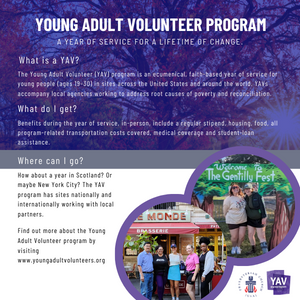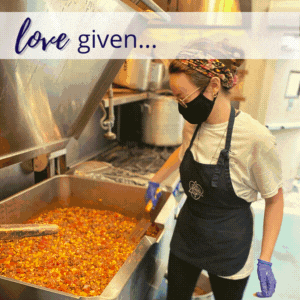Sarah Teetsel grew up in Fulton, New York, and attended Nazareth College in Rochester, NY. After her graduation in May 2011, she served with the Franciscan Volunteer Ministry in Wilmington, Delaware for a year. Looking for more time for reflection, she has been serving with the Benedictines at the Monastery of St. Gertrude in Cottonwood, Idaho. She has enjoyed this opportunity to introduce the sisters to hedgehogs, ipods, and nail polish. This fall she will be attending Bowling Green State University in Ohio for her Masters in Music History.
My daily routine is determined mostly by the posted weekly schedule. While there are always inevitable changes, this routine has become mine over my time here at the Monastery of St. Gertrude. The important distinction for me is not to just go along with the established schedule, but to be open to the greater call.
7:30 – Breakfast
Each day begins with breakfast in silence. As a morning person, this is such a wonderful start to the day. While I may be awake and ready for the day, it is a joy to eat quietly knowing that I will not be socially obligated to chitchat. It should also be noted that “The Great Silence” is respected from 9pm to 9am each day. This means that talking and noise is kept to a minimum, at least until after Morning Praise. This slow yet methodical start helps ease me into the day, setting the pace for the rest of the day as productive and deliberate, without a frenetic energy.
8:30 – Morning Praise
Each prayer begins with a series of chimes and bells, gently calling all to prayer. The essential feature of this call to prayer is that it comes ten minutes before prayer begins. This allows ample time for everyone to arrive calmly, ready to pray rather than skidding in at the last minute, frenzied and distracted. There is one other benefit to arriving sooner rather than later, for if one is sitting quietly before prayer begins, one might notice the special quiet that emerges as people have settled. The feeling of a unified calm yet expectant anticipation becomes apparent from within the quiet, awaiting the transformation of our individual prayers becoming communal. No longer does the individual exists within or even as the self, but there is a merging and melding together, creating a greater whole. I can only describe this experience as truly becoming “one body,” for our prayers are for the whole world, honoring and giving voice to all.
 |
| A literal call to prayer, using the speakerphone |
After morning praise, everyone attends to their work and responsibilities. Presently, this means working at my computer, maybe writing reflection questions for our weekly lectio group or writing my next post for my blog “Peering Beyond the Prayer Book,” a series of reflections and interviews of various members of the community, both religious and lay.
11:30 – Eucharist, Dinner
Work comes to a halt when the bells ring again to call everyone to prayer. As my supervisor has said in one of her explanations of the daily schedule, “Prayer doesn’t interrupt work. Work interrupts prayer.” I try to remember this phrase as I grumble to myself about never seeming to have enough time to finish any of my tasks when I would like. Then I remember that there is a time and a place for everything, and right now, it is time to pray. Everything else can wait; it will be there when I return.
What I find remarkable in this celebration of Eucharist is the ways in which the community interacts. I see a surprising tenderness from the Eucharistic Ministers, heartfelt signs of peace, and a dedication to each member by ensuring that everyone will be able to come and go from Mass. This dedication entails that several sisters help guide the sisters of the Sunshine Wing (also known as the infirmary) back to their rooms. This is how I see the Gospel lived out – through these small gestures that reveal Christ in each of us.
 |
| My make shift office in the corner of the volunteer lounge |
I am not surprised that our main spiritual meal is directly followed by our main physical meal of the day. It would be as if the rest of the day was wiped away and if our entire day existed in just these few hours, it would be enough. Life would have meaning, purpose, and practical sustenance. To further emphasize this point, dinner begins and ends with grace and thanksgiving for what we have. Our actions in prayer would sustain our lives to attain physical nourishment, which would feed us enough to continue to pray, and in this way can we change the world.
After every meal, there is always a plethora of dishes to be washed and put away. Instead of this seeming like a chore, I enjoy this time to catch up with everyone, joking and laughing while still getting the job done. To me, this is community at one of the best moments. Soon enough, it’s time to head back to work.
My afternoons are often less productive than my mornings, so usually I can be found outside enjoying the sunshine and catching up with friends and family using all kinds of technology. Traveling across the country has certainly distanced me from my loved ones, but with a commitment to keeping in touch, my relationships have grown and remain as strong as ever. Frequently at 3:00pm, I will break for teatime with my friend, Postulant Judy. This small break allows both of us to step away from our work and catch up, reflecting and sharing stories of our lives. This routine is altered on Thursdays when I meet for class on Benedictine spirituality with other volunteers. In due course, the challenge I will face is to integrate what I have learned here at the monastery into my daily life, whatever and wherever that may be.
5:00 – Evening Prayer, Supper
Again the bell calls us to prayer. I thought I would escape such an authority once I graduated high school, and yet here again do I find myself spurred into movement by another bell. This time, however, there are not the same consequences. I do not have to go to prayer. No one will say anything. I could finish another chapter of the book I am reading, or watch tv, or get a head start on supper, if I really wanted. Yet day after day, I come to prayer. Why? Besides the reasons I have previously mentioned, there is something to be said for the tradition. Benedictines have been praying for 1,500 years. Judy continues to remind me of this, and she says, “If I choose not to go to prayer, if we all chose not to go, who will?” There is tremendous intentionality in our prayer, but it is quite easy to lose sight of why we are there.
After supper and cleaning more dishes, I join the community for community recreation. While the vast majority of the sisters play pinochle or are occupied with some sort of craft, a brave few play new games with me, most of which have come from the depths of the community game cupboards. These new games have provided unexpected joyful moments, and have certainly taught me great lessons in humility, patience, and competition. Soon enough, everyone begins yawning and heads to bed, and by 9pm, the building is quiet once again.
Each aspect of my day is a reminder for me to see beyond the event or the chore itself, and instead see the central themes of my life. Do I value productivity over time? Community over solitude? Self-awareness over pettiness? In these ways, I am learning lessons for a life of deep richness and greater wholeness.
The goal of the Monastery of St. Gertrude Immersion Program is to introduce volunteers to the contemplative, monastic life as lived in a Benedictine women’s monastery. Volunteers live, pray and work with the sisters and learn about monastic life and work in a monastery department.







 Thousands of faith-based service opportunities can be at your fingertips with the RESPONSE. Download the latest edition today!
Thousands of faith-based service opportunities can be at your fingertips with the RESPONSE. Download the latest edition today!
